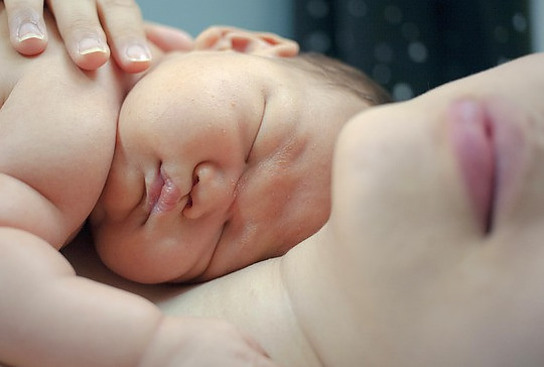
Healthy sleep habits for a healthy baby
One of the most common challenges new parents face is getting their baby to sleep. As you know from our other articles, adequate sleep is crucial for a person’s health and development, and that starts at birth!
Seems like very high-stakes, doesn’t it? Make one tiny mistake in his or her training and your child’s development will be seriously affected: he’ll either end up waking in the night well into his high school years, or worse, develop anxiety, depression, or mood swings. Tackling that responsibility at 1 AM on 3 hours of sleep seems an impossible task.
It can be a daunting task to establish a consistent sleep routine for your little one, especially with every sleep expert offering slightly different advice on the ideal timing and method for sleep training. You may be unsure about who to believe.
In this article, we’ll go over a few strategies that have been scientifically proven to lead to healthy sleep habits for a healthy baby.
Head’s up: Some of the links in this article may be affiliate links of which I receive a small compensation from sales of certain items.
These strategies are scientific research done by Harvard Medical School and the Stanford Center For Sleep Science and Medicine Doctor, along with over 20 years of experience as a clinical psychologist. She developed a proven program called the Baby Sleep Miracle that has helped over 17,643 parents to finally enjoy the restful sleep they have been craving.
Strategy #1 – Learn to Spot Your Child’s Sleep Cues
Like the rest of us, your child has a sleep window of opportunity, a period when he is tired but not too tired.
If you’re having trouble with getting your baby to sleep, chances are you’ve seen them over-tired. If you haven’t, try to remember when you felt over-tired yourself! It can be hard to regulate your body when you are too sleepy, making it difficult to wind down. This rings true for babies, too! It’s important to recognize when your baby is tired so you don’t let them get over-tired. So, how can you tell if your baby is getting sleepy? Here are some sleep cues that your baby is ready to start winding down for a nap or bedtime:
-Your baby is calmer and less active – this is the most obvious cue that your baby is tired and you must act accordingly.
-Your baby may be less tuned in to his surroundings – his eyes may be less focused, and his eyelids may be drooping.
-Your baby may be quieter – if your baby tends to babble up a storm during his more social times of the day, you may notice that the chatter dwindles off as he gets sleepy.
-Your baby may nurse more slowly – instead of sucking away vigorously, your baby will tend to nurse more slowly as he gets sleepy. If he’s sleepy enough, he may even fall asleep mid-meal.
-Your baby may start yawning – if your baby does this, well, that’s a not-so-subtle sign that he’s one sleepy baby.
If you start to notice signs of overtiredness (as listed below), chances are some of your child’s cues are missed. Next time your baby needs to wind down for a nap or bedtime, start their routine about 20 minutes earlier.
Though over-tired behaviour can vary depending on the child, there are some common signs that your child is too sleepy:
-Your child will get a sudden burst of energy at the very time when you think they should be running on empty.
-You’ll start seeing “wired” and hyperactive behaviour, even if such behaviour is totally out of character for your child at other times of the day.
– Your child will “fall apart” and exhibit whiny and argumentative behaviour, or become emotional when nothing else seems to be wrong.
Learning to read your baby’s unique sleep cues is the first step to a more rested and happier baby.
Strategy #2 – Let Your Baby Practice Falling Asleep on His Own
While a routine is very important for babies, sometimes a routine can cause a baby to develop strong associations between their routine and sleep, making it impossible for their bodies to fall asleep without this routine. This doesn’t sound too bad unless that routine involves a parent staying with the child until they are asleep for rituals such as back-rubbing, bottle-feeding, or rocking. So if he gets used to falling asleep in your arms while you rock him and sing to him, he will want you to rock him and sing to him when he wakes up in the middle of the night – that’s the only way he knows how to fall asleep.
This is because he has developed a sleep association that involves you – you have become a walking, talking sleep aid.
We don’t need to fall into an all-or-nothing pattern while maintaining a routine. You can reduce the strength of any particular sleep association by making sure it is only present sometimes when your baby is falling asleep.
If, for example, you nurse your baby to sleep some of the time, rock your baby to sleep some of the time, and try to put your baby to bed just some of the time when he’s sleepy but awake, he’ll have a hard time getting hooked on any sleep association.
Most babies are ready to start practicing these skills around three to four months.
Strategy #3 – Make Daytime Sleep a Priority: Children Who Nap Sleep Better
Scientific research has shown that babies who nap during the day sleep better and longer at nighttime. While you might think that skipping babies’ daytime naps might make it easier to get them off to bed in the evening, babies typically end up being so overtired that they have a very difficult time settling down at bedtime. They don’t sleep particularly well at night.
You can think of naps like snacks and bedtime sleep as meals: you make sure that your child has balanced snacks and meals regularly. Your child needs nutritious sleep snacks during the day in addition to his main nighttime sleep meal to be at his very best.
Strategy #4 – Know When Your Baby No Longer Needs to Be Fed At Night
If your baby goes without that nighttime feeding sometimes or doesn’t seem particularly interested in nursing once he gets up in the night, it might be time to eliminate that nighttime feeding and use non-food methods to soothe him back to sleep.
As discussed in Strategy #2, babies can form sleep associations with routines. Feeding can be a particularly strong association, so eliminating nighttime snacks as soon as possible will help your baby learn to self-soothe instead of relying on food to get back to sleep.
Conclusion
Though every child develops differently, hopefully, these tips will help you along your baby’s sleep journey! It’s important to remember that it’s a process; no child will sleep perfectly from day one. When you start to feel frustrated, remember that you’re doing the best for your baby, and it will improve with time! Take a deep breath, and remember: you’ve got this!
If you are still struggling, here is one proven system called Baby Sleep Miracle. Baby Sleep Miracle Guide provides parents with a simple and easy-to-apply solution to regulate their children’s sleeping patterns and scientifically proven methods to get their babies to sleep.
Check it out >>> BABY SLEEP MIRACLE
Let me know your struggles with your baby not sleeping or what works best for you; I’d love to hear!





